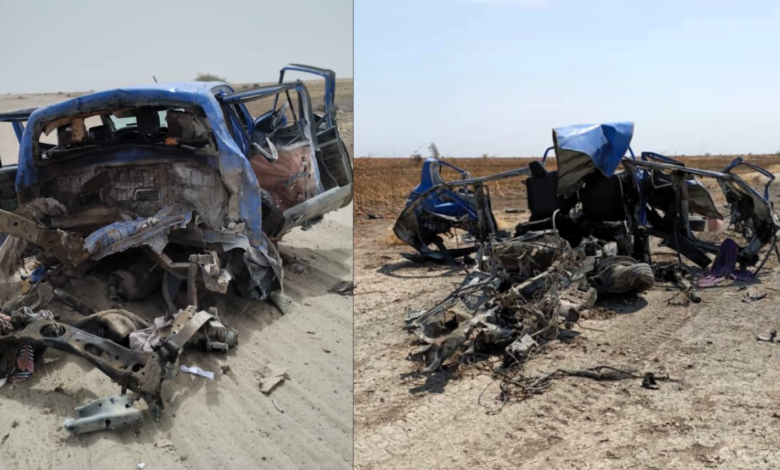Landmine Attacks Spike In Borno With 16 Killed In A Week, Including Pregnant Woman
Amid military clampdown, a series of deadly landmine attacks by insurgents in Nigeria’s Borno state have recently claimed 16 lives, including security agents and civilians, sparking fear and calls for action.

Borno state in North East Nigeria is reeling from a spate of deadly landmine attacks, with violent extremist groups blamed for the recent surge in violence that has claimed at least 16 lives.
The central region of the state was on Thursday, May 2, rocked by a devastating incident where a passenger vehicle struck a landmine, leading to the death of all five occupants, including a pregnant woman whose unborn child was also ripped out and tragically killed.
This attack came a day after 11 members of the Civilian Joint Task Force (CJTF) — a group formed to support Nigeria’s armed forces in the fight against insurgency — were killed on the Dikwa-Gamboru highway.
The fear among commuters is palpable, with many deeming the highway a high-risk route due to the increasing frequency of such attacks.
Authorities from the Borno state police have not yet released an official statement regarding these tragic events.
The Gamboru-Ngala highway in Borno has become a hotspot for Boko Haram’s deadly strategy of targeting security forces and civilians alike with hidden explosives.
In January, the highway claimed at least 10 lives in similar landmine explosions.
The use of landmines by extremist groups Boko Haram and the Islamic State West Africa Province (ISWAP) on these critical routes not only disrupts the safety of travel but also indicates a persistent threat that requires urgent and comprehensive measures to safeguard the lives of Borno’s residents.
“I have had business to do at Gamboru border town since last week, but honestly, my family has advised me against embarking on the trip for now due to the recent videos of attacks we saw,” said Abdullahi Wakili, a commercial driver. “Many of our colleagues have died in landmines planted by Boko Haram, and we need the government to intervene by scaling up patrol on the route. ”
Danbatta Bello, a chieftain of the Civilian-JTF, confirmed the sad developments to HumAngle in Maiduguri at the weekend and lamented the increasing casualties the group has suffered in recent times.
“Ours has been a service of sacrifice and commitment, but the recent events are even more horrible given the fact it involved civilians, women and children,” he said. “We lost 11 of our members on Wednesday, and that was days after we lost some of our members in Zamfara. But that will not even dampen our commitment to support the government in ending this terrorism by the grace of God.”
A senior military source, speaking on the condition of anonymity, provided insight into the terrorists’ current tactics.
“The ISWAP terrorists have been drastically reduced in number, and as a result, they are increasingly turning to the use of improvised explosive devices (IEDs) as a desperate attempt to assert their relevance,” he said, identifying Gamboru Ngala, Kukawa, and Gajibo as the hotspots for such attacks.
The source elaborated on the impact of these IED attacks, explaining that while they are intended to target military forces, “it’s the innocent civilians who often bear the brunt of the violence”.
He argued that ISWAP’s capacity for conducting large-scale ground attacks has diminished, forcing it to employ “massive IEDs to achieve maximum casualties and undermine the morale and efforts of our soldiers”.
Reflecting on recent events, the source recounted, “Similar attacks were carried out on the roads leading to Kukawa, Gajibo, and Dikwa on April 17 and 27, 2024.” He confirmed that these attacks involved a civilian vehicle and a CJTF vehicle, respectively, and were characterised by the use of large explosive devices intended to maximise fatalities.
There is a significant level of concern within military circles regarding the potential escalation of IED-related violence. “Recent intelligence suggests that there could be around 2,000 individuals trained to plant such IEDs” in their desperate bid to slow down the military campaigns around Lake Chad, the military source said.
Another impediment to counterinsurgency operations on the said axis is the poor state of roads along Dikwa, Ngala, and Kukawa.
“Due to the poor state of road infrastructure, it takes a long time to patrol and scan for mines, instead of a few hours. These criminals take advantage of the cratered loose sands to easily plant mines at night.”
Support Our Journalism
There are millions of ordinary people affected by conflict in Africa whose stories are missing in the mainstream media. HumAngle is determined to tell those challenging and under-reported stories, hoping that the people impacted by these conflicts will find the safety and security they deserve.
To ensure that we continue to provide public service coverage, we have a small favour to ask you. We want you to be part of our journalistic endeavour by contributing a token to us.
Your donation will further promote a robust, free, and independent media.
Donate HereStay Closer To The Stories That Matter




